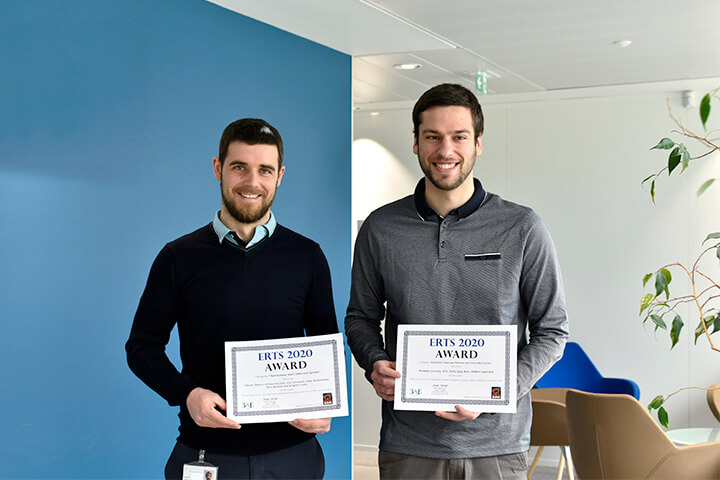The IRT Saint Exupéry has sponsored the 10th edition of the European Congress ERTS 2020 with a booth to present its activities in Intelligent Systems & Communications and Systems Engineering & Modeling. With 5 paper presentations and 2 paper awards won by Romain Leconte and Vincent Mussot, these 3 days demonstrated the scientific excellence of the institute.
The 10th European Congress ERTS 2020 on Embedded Real Time Software & Systems took place in Toulouse (France) from 29th to 31st January 2020.
This congress has been organized jointly by 3AF (the French Society of Aeronautic & Aerospace) and SEE (the French Society for Electricity, Electronics, and Information & Communication Technologies).
The 2020 edition focused on “embedded computing platforms and networked systems, processes, methods and tools, resilience, human systems, associated and connected systems.”
The IRT Saint Exupéry has presented its activities from the Intelligent Systems & Communication and the Systems Engineering & Modeling domains and numerous papers during these 3 days.
Paper Awards
Vincent Mussot & Romain Leconte won 2 Paper Awards for their papers entitled “Make life easier for Embedded Software Engineers Facing Complex Hardware Architectures” (Romain Leconte, IRT Saint Exupéry) & “Formal Approach for the Verification of Onboard Autonomous Functions in Observation Satellites” (Vincent Mussot, IRT Saint Exupéry) and thus contribute to the influence of the IRT Saint Exupéry through the scientific excellence of their work.
All paper presentations
“Formal Approach for the Verification of Onboard Autonomous Functions in Observation Satellites”
Silvano Dal Zilio – LAAS-CNRS, France Vincent Mussot – IRT Saint Exupéry, France Loïc Correnson – CEA, List, Software Safety and Security Lab, France Serge Rainjonneau – Institute of Research and Technology (IRT) Saint-Exupéry, France Yves Bardout – IRT Saint Exupéry, France Grégoire Scano – Institute of Research and Technology (IRT) Saint-Exupéry, France“Make life easier for Embedded Software Engineers Facing Complex Hardware Architectures”
Romain Leconte – IRT Saint Exupéry & Space Codesign Europe, France Eric Jenn – Thales Avionics, France Guy Bois – Polytechnique Montreal/Space Codesign Systems, Canada Hubert Guerard – Space Codesign Systems Inc, Canada“Current Challenges in the Certification of Machine Learning for Safety Critical Systems”
Eric Jenn – IRT Saint Exupéry, France Alexandre Albore – IRT Saint Exupéry, France Franck Mamalet – IRT Saint Exupéry, France Grégory Flandin – IRT Saint-Exupéry, France Christophe Gabreau – AIRBUS SAS, France Hervé Delseny – AIRBUS SAS, France Adrien Gauffriau – AIRBUS SAS, France Hugues Bonin – Continental, France Lucian Alecu – Continental, France Jérémy Pirard – Continental, France“Build Your Own Static WCET Analyzer: the Case of the Automotive Processor AURIX TC275”
Wei-Tsun Sun – IRT Saint Exupéry, France Eric Jenn – IRT Saint Exupéry, second by Thales AVS., France Hugues Hugues Cassé – IRIT – University of Toulouse, France“Accounting for interferences in the design of Time-Triggered Applications”
Antoine Ferlin – IRT Saint Exupery, France Eric Jenn – Thales AVS and IRT Saint Exupery, France Marc Kaufmann – Safran Electronics and Defense, France“Using Model Checking to Identify Timing Interferences on Multicore Processors”
Viet Anh Nguyen – IRT Saint Exupery, France Eric Jenn – IRT Saint Exupery, France Wendelin Serwe – Univ. Grenoble Alpes, Inria, CNRS, France Frederic Lang – Univ. Grenoble Alpes, Inria, CNRS, France Radu Mateescu – Univ. Grenoble Alpes, Inria, CNRS, France“Early validation of satellite COTS-on-board computing systems”
Philippe Cuenot – IRT Saint Exupéry, France Julien Deantoni – Université Cote d’Azur, I3S/INRIA Kairos, France Amin Ouestali – IRT Saint Exupéry, France Paul Bouche – IRT Saint Exupéry, France Robert De Simone – INRIA Kairos, France
Booth & Panel
Also present on a booth, the teams of the IRT Saint Exupéry were able to exchange ideas and carry out some demonstrations. Cappella models demonstrated how to experiment with new approaches to interacting with modeling tools.
The teams also took part in the panel “Certification of Machine Learning for Safety Critical Applications”, with the DEEL project that involves academic and industrial partners in the development of dependable, robust, explainable and certifiable artificial intelligence technological bricks applied to critical systems.


